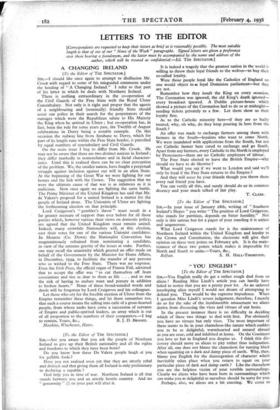LETTERS TO THE EDITOR
[Correspondents are requested to keep their letters as brief as is reasonably possible. The most suitable length is that of one of our "News of the Week "paragraphs. Signed letters are given a preference over those bearing a pseudonym, and the latter must be accompanied by the name and address of the author, which will be treated as confidential.—Ed. THE SPECTATOR.]
A CHANGING IRELAND
[To the Editor of THE SPECTATOR.] SIR,—I should like once again to attempt to disillusion Mr. Crook with regard to some of his misguided comments under the heading of "A Changing Ireland." I refer to that part of his letter in which he deals with Northern Ireland.
There is nothing extraordinary in the co-operation of the Civil Guards of the Free State with the Royal Ulster Constabulary. Not only is it right and proper that the agents of a neighbouring and (nominally) friendly State should assist our police in their search for the perpetrators of the outrages which were the Republican salute to His Majesty the King when he arrived in Ulster ; but co-operation has, in fact, been the rule for some years past, the Twelfth of August celebrations in Derry being a notable example. On this occasion the railway line from Strabane to Derry, which for part of its length runs within the Free State border, is patrolled by equal numbers of constabulary and Civil Guards.
On the main issue I beg to differ from Mr. Crook. He may not be aware that there are two distinct nations in Ireland ; they differ markedly in nomenclature and in facial character- istics. Until this is realised there can be no clear perception of the problem. We, the smaller nation, have fought a perpetual struggle against inclusion against our will in an alien State. At the beginning of the Great War we were fighting for our homes and the link with the Crown. The suggestion that we were the ultimate cause of that war is as infamous as it is malicious. Now once again we are fighting the same battle. The Prime Minister of the United Kingdom has said that Mr. de Valera's proposal for a united Ireland is a matter for the people of Ireland alone. The Unionists of Ulster are fighting the forthcoming election on that principle.
Lord Craigavon's "gambler's throw" must result in a • far greater measure of support than ever before for all those parties which, however various their views on domestic policy, are agreed that the United Kingdom must remain united. Indeed, many erstwhile Nationalists will, at this election, cast their votes for one of the various Unionist candidates. In Mourne (Co. Down) the Nationalist Convention has magnanimously refrained from nominating a candidate, in view of the extreme gravity of the issues at stake. Further, one may recall the unanimity which greeted an offer made on behalf of the Government by the Minister for Home Affairs, in December, 1934, to facilitate the transfer of any persons who so wished to the Free State. There was no response. Even the Irish Press, the official organ of Fianna Fail, admitted that to accept the offer was "to cut themselves off from associations and ties as _dear to them as life . . . and to run the risk of having to endure want and penury in addition to broken hearts." None of these broad-minded words and deeds will be forgotten by Lord Craigavon and his colleagues.
Let those who cry for the forcible ejection of Ulster from the Empire remember these things, and let them remember too, that such a course means the selling into exile of a great-hearted people, from whose ranks have come a succession of servants of Empire and public-spirited leaders, an array which is out of all proportion to the numbers of their compatriots.—I beg to remain, Yours, &c., B. J. D. BROOKE. Hawkins, Winchester, Hants.














































 Previous page
Previous page